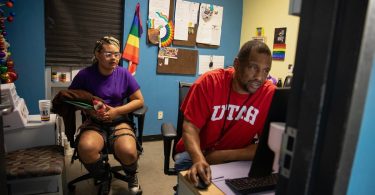It’s time for students to head to college (Photo: Scott Webb | Unsplash)
Congratulations and commiserations: Your child is heading off to university or college. Well done on helping them through their school years.
Commiserations? Well, although some may relish watching their kids move out, for others, waving a child goodbye can be a heartbreaking. Cutting the apron strings can be a challenge.
It can represent the end of one stage of your ‘family’ life and an evolution in family dynamics. Your child is becoming an adult.
If your kid falls on the LGBTI spectrum, sending them out into the unknown can seem particularly scary. You may already struggle to understand their feelings. Thoughts of ‘Who are they going to hang out with?’; ‘What clubs are they going to go to?’; ‘What will they get up to?’ might be keeping you awake at night.
This is pretty common for any parent waving their kid off to college, but even more so for the straight parents of LGBTI kids. ‘Will they be safe?’ is a thought paramount in most parents’ mind.
I escaped my small hometown as soon as I was able to get away at 18. I headed straight for college in London. To say that I was ready to kick down that closet door would be an understatement. This was at the height of the AIDS epidemic. No wonder my parents worried. Looking back, they had good reason to do so.
I have heard many stories about gay kids feeling alienated from their families. Countless times, queer people celebrate the family they find or create for themselves, as an alternative to their blood family.
To a degree, this is inevitable. New, important and strong friendships will be forged at college. But why does this become so important to LGBTI kids? It’s because we find people who have shared the same experiences of us; people who have tasted the same oppression and discrimination.
We find others with whom we feel safe to confide our fears, feelings and fantasies – without judgment. We find people who validate us, when we may not have felt validated before.
I hope this doesn’t apply to you. I hope that you have always strived to make your child feel worthy and validate, supported and loved. But if in doubt or uncertain, below are just a few pieces of advice to bear in mind.
Tell your child you love them
This may sound obvious or you may feel it unnecessary. It may not come naturally. But your child may be living away from home for the first time. It’s daunting and they can feel lost. Reminding them they are loved – either at the end of a phone call or text message – helps.
You can never remind someone often enough that they are loved. Period.
Show interest in their friendships but don’t demand answers to everything
Let them discuss the things they are comfortable discussing. Sure, if they’re asking for financial assistance every other week, you’re entitled to ask how they’re spending their money. But if they happen to drop into the conversation a new friend, don’t push to know the nature of their relationship.
If they want to introduce a new partner to you, allow them to do it at their own pace.
Accept the fact they will likely meet people online
OK, you probably don’t like to think about your precious boy hooking up with someone on Grindr or Tinder. But it’s also quite likely.
Nowadays, meeting people online is common, whatever your sexuality. A recent survey found that 1 in 5 people who were engaged met their partner online. This is likely to be even higher for LGBTI people.
If your child tells you they met someone online, you really don’t need to know which app or site they used, so don’t ask unless they want to share.
Ensure they know about app safety, and that it’s best to meet in a public place, etc. But don’t freak out if they tell you they’re going on an internet date. Online is where we meet up, these days.
Make sure they are aware of their sexual health
OK, this is usually a very awkward conversation for any parents and offspring to have. But it’s important. And even if your kid resists getting into such conversations, they will go away knowing that you at least care.
If your child is gay, sex is something that you might not want to think about. But it’s not taught in schools and so we stumble into it pretty much in the dark or picking up our cues from pornography. It’s a less than ideal situation.
Do they know about protection? Does your son know how to use a condom? Have they heard about PrEP? Actually, have you heard about PrEP? (it’s a course of medication available in some countries that will stop the taker acquiring HIV). Have they had hepatitis or HPV vaccinations?
Your gay or queer kid is unlikely to come to you for their sexual health information. And that’s OK. But raising the issue may at least plant the seed in their mind that it’s something to think about. And it again reinforces the fact that you care about their wellbeing.
Speak to others in the same situation
Feeling alone or lost as the parent of an LGBTI child? You’re most certainly not alone. PFLAG (originally Parents, Families and Friends of Lesbians and Gays) has networks across the US and in a handful of other countries. Even if it’s not active in your location, it has plenty of online resources and publications.
You maybe think you understand your child better than anyone else. Your relationship with them is unique and will be unlike any other in their lives. But that doesn’t mean you understand the support they might need as a young LGBTI adult.
If in doubt, just keep talking to them. And keep reminding them they are loved.






